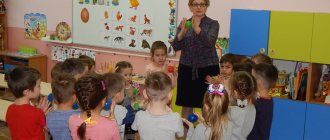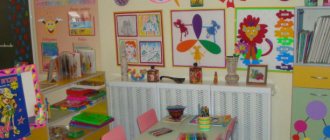What is speech culture
Culture refers to the mastery of oral and written language. The development of a teacher’s speech culture, in addition to language norms, includes non-normative speech behavior, the use of jargon or unpleasant neologisms. At the same time, low culture is revealed.
You may be interested in:A ridiculous act is a surefire way to become famous
The norms of the language are gradually changing, new words are being added that were previously incomprehensible. Culture and attitudes change under the influence of the media, society, and media personalities.
The teacher’s speech culture should not be distorted under the influence of modern realities. Much attention is paid to this during professional training. A person working with children must become familiar with the norms of literary language and oratory techniques. Be able to find a common language with the team and children.
Speech culture of a preschool teacher.
“YOUR SUCCESS IS YOUR SPEECH!”
Part I.
Requirements for the quality of speech of a preschool teacher
It is no coincidence that it is believed that a person’s speech is his calling card, since his success not only in everyday communication, but also in professional activities depends on how competently he expresses himself. This statement is especially relevant in relation to the speech of a teacher working with preschool children.
Reading an excerpt from a story
Mikhail Zoshchenko “Monkey tongue”
This Russian language is difficult, dear citizens! The trouble is, what a difficult one.
The main reason is that there are too many foreign words in it. Well, take French speech. Everything is good and clear. Keskose, merci, comsi - all, please note, purely French, natural, understandable words.
Come on, come on now with the Russian phrase - trouble. The whole speech is peppered with words with a foreign, vague meaning.
This makes speech difficult, breathing is impaired and nerves fray.
I heard a conversation the other day. There was a meeting. My neighbors started talking.
It was a very smart and intelligent conversation, but I, a person without a higher education, had difficulty understanding their conversation and flapped my ears.
The matter began with trifles.
My neighbor, not yet an old man with a beard, leaned over to his neighbor on the left and politely asked:
- What, comrade, will this be a plenary meeting or what?
“Plenary,” the neighbor answered casually.
“Look,” the first one was surprised, “that’s why I’m looking, what is it?” As if it were plenary.
“Yes, be calm,” the second one answered sternly. “Today it’s very plenary and the quorum has reached such a level - just hold on.”
- Yah? — asked the neighbor. “Have we really reached a quorum?”
“By God,” said the second.
- And what is this quorum?
“Nothing,” the neighbor answered, somewhat confused. “I got there, and that’s it.”
“Just tell me,” the first neighbor shook his head sadly. “Why would it be him, huh?”
The second neighbor spread his hands and looked sternly at his interlocutor, then added with a soft smile:
“You, comrade, probably don’t approve of these plenary sessions.” But somehow they are closer to me. Everything somehow, you know, comes out in them minimally to the essence of the day. Although I will say frankly that lately I have been quite permanent about these meetings. So, you know, the industry is going from empty to empty.
“This is not always the case,” the first objected. “If, of course, you look at it from the point of view.” To enter, so to speak, into the point of view and from the point of view, then yes - the industry specifically.
“Specifically, in fact,” the second one sternly corrected.
“Perhaps,” the interlocutor agreed. “I admit that too.” Specifically in fact. Although as when.
“Always,” the second one cut short. “Always, dear comrade.” Especially if after the speeches the subsection is brewing minimally. Discussions and shouting will not end then.
A man walked up to the podium and waved his hand. Everything fell silent. Only my neighbors, somewhat heated by the argument, did not immediately fall silent. The first neighbor could not come to terms with the fact that the subsection was welded minimally. It seemed to him that the subsection was brewed a little differently.
They shushed my neighbors. The neighbors shrugged their shoulders and fell silent. Then the first neighbor leaned over to the second again and quietly asked:
- Who is this guy who came out there?
- This? Yes, this is the presidium. A very sharp man. And the speaker is the first. He always speaks sharply on the essence of the day.
The speaker extended his hand forward and began speaking.
And when he uttered arrogant words with a foreign, vague meaning, my neighbors nodded their heads sternly. Moreover, the second neighbor looked sternly at the first, wanting to show that he was still right in the dispute that had just ended.
It is difficult, comrades, to speak Russian! 1925
Preschool age is a sensitive period for a child’s speech development, therefore one of the leading activities of a kindergarten teacher is the formation of oral speech and verbal communication skills, based on knowledge of the native literary language.
One of the main mechanisms for children to master their native language is imitation.
MM. Alekseeva notes that, imitating adults, the child adopts “not only all the subtleties of pronunciation, word usage, and phrase construction, but also those imperfections and errors that are found in their speech.”
That is why high demands are placed on the speech of a teacher in a preschool educational institution today, and the problem of improving the teacher’s speech culture is considered in the context of improving the quality of preschool education.
The quality of speech development of a preschooler depends on the quality of speech of teachers and on the speech environment that they create in a preschool educational institution.
Researchers such as A.I. Maksakov, E.I. Tikheyeva, E.A. Flerin, paid special attention to the creation of a developmental speech environment in kindergarten as a factor in the development of children’s speech. In their opinion, preschool workers should be charged with creating an environment in which “children’s speech could develop correctly and unhindered.”
In modern studies of the problems of improving the teacher’s speech culture, the components of his professional speech and the requirements for it are highlighted.
The components of a teacher’s professional speech include :
quality of language design of speech;
value and personal attitudes of the teacher;
communicative competence;
clear selection of information to create a statement;
orientation towards the process of direct communication.
Among the requirements for the speech of a preschool teacher are:
Correctness – compliance of speech with language norms. The teacher needs to know and follow the basic norms of the Russian language when communicating with children: orthoepic norms (rules of literary pronunciation), as well as norms for the formation and modification of words.
Accuracy is the correspondence between the semantic content of speech and the information that underlies it. The teacher should pay special attention to the semantic (notional) side of speech, which contributes to the development of children's skills of accurate word use.
Logicity is the expression in semantic connections of the components of speech and the relationships between the parts and components of thought. The teacher should take into account that it is in preschool age that ideas about the structural components of a coherent utterance are laid down, and the skills of using various methods of intratextual communication are formed.
Purity is the absence in speech of elements alien to the literary language. Elimination of non-literary vocabulary is one of the tasks of speech development in preschool children. When solving this problem, taking into account the leading mechanism of speech development of preschool children (imitation), the teacher needs to take care of the purity of his own speech: the use of filler words, dialect and slang words is unacceptable.
Expressiveness is a feature of speech that captures attention and creates an atmosphere of emotional empathy. The expressiveness of a teacher’s speech is a powerful tool for influencing a child. The teacher’s mastery of various means of expressive speech (intonation, tempo of speech, strength, pitch of voice, etc.) contributes not only to the formation of the arbitrary expressiveness of a child’s speech, but also to a more complete awareness of the content of an adult’s speech, and the formation of the ability to express his attitude to the subject of conversation.
Richness is the ability to use all linguistic units in order to optimally express information. The teacher should take into account that in preschool age the foundations of the child’s vocabulary are formed, therefore the rich vocabulary of the teacher himself not only helps to expand the child’s vocabulary, but also helps to develop his skills in the accuracy of word use, expressiveness and figurative speech.
Relevance is the use in speech of units that correspond to the situation and conditions of communication. The appropriateness of a teacher’s speech presupposes, first of all, having a sense of style. Taking into account the specifics of preschool age aims the teacher at developing a culture of speech behavior in children (communication skills, the ability to use various formulas of speech etiquette, focus on the communication situation, the interlocutor, etc.).
Of course, the teacher of a preschool educational institution’s knowledge of these requirements, their compliance and constant improvement of the quality of his speech is the key to the success of work on the speech development of children in preschool educational institutions.
What is speech culture?
First of all, this is the degree of proficiency in language norms (in the field of pronunciation, stress, word usage and grammar) as well as the ability to use all expressive means of language in different conditions of communication (communication) and in accordance with the goals set in the content of statements.
In addition, the culture of speech is a special linguistic discipline aimed at studying and improving the literary language as an instrument of national culture, the guardian of the spiritual wealth of the people.
Cultural speech is an essential element of a person’s general culture.
Part II.
Workshop “Test your literacy.”
The form of organization of teachers is small groups of 3-4 people.
Correct speech is the foundation of linguistic culture; without it there is and cannot be either literary artistic mastery or the art of the living and written word.
2.1 Grammatical correctness (green paper)
- Conjugate the verbs: run, want.
In what case is the form of the verb run used?
- Form the imperative form of the verbs:
Go – go (those); run - run(those); wave – wave (those), wave (those); sit down - sit down (those); lie down - lie down (those).
- Determine the gender of nouns and use the word in the correct form:
The windows are curtained (tulle)
Face hidden (veil)
The roof is being covered (tar paper)
Wash my hair (shampoo)
Head covered (shawl)
- Complete the sentences using the noun in the correct form:
I stood up, taking the child off my lap.
There are a lot of (apple trees), (cherries), (currants) in the garden.
The flu quarantine lasted 22 (days).
I bought all the gardening tools except (rakes).
2.2 Orthoepic correctness (blue paper)
- Place the emphasis and read the words: calling, more beautiful, pampering, pampering, spoiled, thinking, expert, money, plum, beets, cottage cheese, provision.
- Correctly use words in the genitive singular: bandage, pancake, cake, bow, goose.
- Correctly use words in the accusative case singular: board, river, cheek, beard, wall, harrow.
2.3. Vocabulary (pink paper)
- Correct sentence:
He is a complete ignoramus in matters of art.
The boy put on his coat and hat and went for a walk.
Kolya is the leading leader of our group.
When I returned back to my friends, everyone was very happy.
The conversation with the children came to its final end.
All children completed the assigned task on time.
The doctor prescribed medicine for the children.
- Synonymy. Explain the meanings of words. Make sentences with each of the words.
Old Ancient Old Old Ancient.
Having cited this series of synonyms-adjectives, the writer D.I. Fonvizin explained the semantic difference between them: “Old is what was new a long time ago; something that has been going on for a long time is called ancient. Something that has passed a long time is long ago. In the present usage, dilapidated is something that has decayed or collapsed due to old age. What is ancient is what happened in the most distant centuries.” To illustrate these meanings, D.I. Fonvizin gives the following continuation: “An old man usually likes to remember ancient incidents and talk about ancient customs; and if he is stingy, then you will find a lot of old things in his chests. There are as many of these examples now as there were in ancient times.”
So, the words included in the synonymous row mean approximately the same thing and at the same time not the same thing; they contain a common meaning for them, but different shades of it. It is the latter that play a role when using synonyms: they resemble the shades of paint in an artist, the nuances of sounds in a musician.
2.4. Spelling.
Vocabulary dictation: plasticine, art, applique, feel, charm, participate, safe, association, retelling, storytelling
Part III.
- Sayings of great people about speech (yellow paper).
“The word is one of man’s greatest weapons. Powerless in itself, it becomes powerful and irresistible when said skillfully, sincerely and on time” (A.F. Koni).
Tell me the word and I will tell you who you are! Socrates.
There are people who speak beautifully, but write far from it. This is because the place, the listener, etc. heats them up and draws out more from their minds than they could give without that heat. B. Pascal
Those who claim that they have a lot of thoughts in their heads, but cannot express them due to lack of eloquence, have not learned to understand themselves. M. Montaigne
Who among us doesn’t want to learn how to speak eloquently and convincingly! After all, the word accompanies us everywhere, and our language is a sign of intelligence or stupidity. Every intellectual profession is a speech one, therefore “the path in any career is strewn with the flowers of eloquence” (A.P. Chekhov).
He who keeps his mouth and his tongue keeps his soul from troubles.
From the Book of Solomon's Proverbs
Those who cannot speak will not make a career. Napoleon
- Reflection. “Unfinished sentence” technique.
Today's seminar helped me make sure...
Helped me complete my assignments...
During the seminar I was...
I rate the seminar...
Aspects of a teacher’s professional language
You may be interested in: Potatoes: characteristics, biological features, varieties, applications
The culture of professional speech of a teacher is built on three aspects:
- normative;
- communicative;
- ethical.
Normative involves familiarity with the literary norms of the Russian language. It is important to use them correctly when speaking. A teacher is a person who needs to establish contact with students, sometimes with their parents. Knowing the normative aspect does not solve this problem. When communicating, you need to take into account the age, mood, and interests of the interlocutor. Correctly chosen words and the use of linguistic means are called communicative aspects.
The ethical aspect includes compliance with the rules of behavior, respect for the listener, tactfulness, goodwill and delicacy in communication. Compliance with etiquette allows you to determine the level of a person’s education.
You may be interested in: One and two “n” in adverbs. How to write correctly?
Determining the three components of a teacher’s speech culture and the ability to use them during a conversation allows you to establish contact when communicating with other people. Culture refers to the knowledge and skills that a person uses when communicating with others.
The culture of speech of the teacher and parent. Do you make these mistakes?
What typical mistakes are most often found in the speech of parents and teachers when communicating with young children? The culture of speech of the teacher and parent.
There is such an anecdote: “To everyone who says: “Why write correctly, we are not in a Russian language lesson,” I wish to meet a surgeon who will operate on them with the words: “Why carefully cut and sew up? We’re not taking cutting and sewing courses” :).
Therefore, the question of whether good speech is needed in life does not require an answer - we always need it to solve the most pressing problems of life! The ecology of language is a component of the ecology of culture, and the task of preserving and nurturing a child’s speech culture is no less important than the task of preserving nature.
In order for children’s speech to develop successfully, a developing speech environment is needed. What it is?
The speech environment is any language patterns that a child perceives: this is the speech of the adults and children close to him, teachers, as well as television, films, theater, the speech of people in transport and shops, in a museum and on the street, etc. But for a small child of preschool age, the speech environment is, first of all, the speech of those people with whom he communicates constantly - that is, parents and teachers of a kindergarten or children's center. By imitating them, the baby adopts all the subtleties of constructing phrases, intonation, tempo and melody of speech, and the use of words, but he also accepts all the mistakes!
Many outstanding people developed their linguistic abilities and literary gifts under the influence of the adults with whom they interacted as children. Let us remember the poetic speech of Arina Rodionovna, A.S.’s nanny. Pushkin. What about M. Gorky’s literary abilities? The writer developed them under the influence of his grandmother. He wrote about his grandmother: “She spoke, somehow singing the words in a special way, and they easily became stronger in my memory, like flowers, just as affectionate, bright, juicy.”
The culture of speech of an adult who constantly communicates with a child has two sides (G.O. Vinokur): 1) correct speech, i.e. speech without errors, 2) skillful and skillful speech - that is, the appropriate use of phrases, or the optimal use of linguistic means to solve one’s life problems.
Let's check ourselves to see if we are like the surgeon from the joke with which our article began. Are we speaking to children correctly?
Rule 1.
In speech, one must avoid the constant use of proverbs:
“as if”, “in fact”, “so to speak”, “like”, “so”, “this”, “well” - they make the speech funny, torn, incoherent. L.V. Shcherba called such words “packaging material,” completely unnecessary for conveying meaning.
This is what happens





